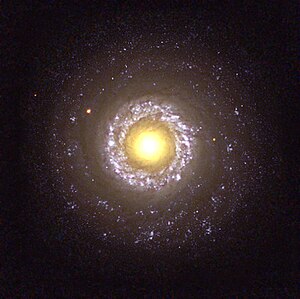| NGC 7742 | |
|---|---|
 A Hubble Space Telescope (HST) image of NGC 7742. A Hubble Space Telescope (HST) image of NGC 7742.Credit: NASA/ESA/STScI/AURA. | |
| Observation data (J2000 epoch) | |
| Constellation | Pegasus |
| Right ascension | 23 44 15.7425 |
| Declination | +10° 46′ 01.3″ |
| Redshift | 0.005547±0.000003 |
| Heliocentric radial velocity | 1663±1 km/s |
| Galactocentric velocity | 1809±6 km/s |
| Distance | 72.4 ± 6.2 Mly (22.20 ± 1.90 Mpc) |
| Apparent magnitude (V) | 12.35 |
| Characteristics | |
| Type | SA(r)b, LINER/HII |
| Size | ~50,700 ly (15.55 kpc) (estimated) |
| Apparent size (V) | 1.778 × 1.698 moa |
| Other designations | |
| UZC J234415.8+104601, IRAS 23417+1029, 2MASX J23441571+1046015, UGC 12760, MCG +02-60-010, PGC 72260, CGCG 432-023 | |
| References: SIMBAD: Search NGC 7742 data | |
NGC 7742 also known as Fried Egg Galaxy is a face-on unbarred spiral galaxy in the constellation Pegasus. Its velocity with respect to the cosmic microwave background is 1292 ± 26 km/s, which corresponds to a Hubble distance of 62.2 ± 4.5 Mly (19.06 ± 1.39 Mpc). In addition, six non-redshift measurements give a farther distance of 84.09 ± 26.51 Mly (25.783 ± 8.129 Mpc). It was discovered by German-British astronomer William Herschel on 18 Oct 1784.
NGC 7742 is unusual in that it contains a ring but no bar. Typically, bars are needed to produce a ring structure. The bars' gravitational forces move gas to the ends of the bars, where it forms into the rings seen in many barred spiral galaxies. In this galaxy, however, no bar is present, so this mechanism cannot be used to explain the formation of the ring. O. K. Sil'chenko and A. V. Moiseev proposed that the ring was formed partly as the result of a merger event in which a smaller gas-rich dwarf galaxy collided with NGC 7742. As evidence for this, they point to the unusually bright central region, the presence of highly inclined central gas disk, and the presence of gas that is counterrotating (or rotating in the opposite direction) with respect to the stars. It is also classified as a Type II Seyfert Galaxy.
Supernovae
Two supernova has been observed in NGC 7742:
- SN 1993R (type II, mag. 17) was discovered by the Leuschner Observatory Supernova Search (LOSS) on 2 June 1993.
- SN 2014cy (type IIP, mag. 16.2) was discovered by Ken'ichi Nishimura on 31 August 2014.
See also
- NGC 7217 - a face-on spiral galaxy with identical characteristics
- Sombrero Galaxy - a similar galaxy with a dust ring
Gallery
References
- Filho, M. E.; Barthel, P. D.; Ho, L. C. (October 2002). "The Nature of Composite LINER/HII Galaxies, Part II". The Astrophysical Journal Supplement. 142 (2): 223–238. arXiv:astro-ph/0205196. Bibcode:2002ApJS..142..223F. doi:10.1086/341786. ISSN 0067-0049. S2CID 16100301.
- ^ "NASA/IPAC Extragalactic Database". Results for object NGC 7742. Retrieved 2006-08-20.
- "Centre de Données astronomiques de Strasbourg". Results for NGC 7742. Retrieved 2008-07-09.
- "Distance Results for NGC 7742". NASA/IPAC EXTRAGALACTIC DATABASE. NASA. Retrieved 7 December 2024.
- Seligman, Courtney. "New General Catalogue Objects: NGC 7742". Celestial Atlas. Retrieved 7 December 2024.
- ^ O. K. Sil'chenko; A. V. Moiseev (2006). "Nature of Nuclear Rings in Unbarred Galaxies: NGC 7742 and NGC 7217". Astronomical Journal. 131 (3): 1336–1346. arXiv:astro-ph/0512431. Bibcode:2006AJ....131.1336S. doi:10.1086/499945. S2CID 14589261.
- Treffers, R. R.; Leibundgut, B.; Filippenko, A. V.; Richmond, M. W. (1993). "Supernova 1993R in NGC 7742". International Astronomical Union Circular (5812): 1. Bibcode:1993IAUC.5812....1T.
- "SN 1993R". Transient Name Server. IAU. Retrieved 7 December 2024.
- Nishimura, K. (2014). "Supernova 2014cy in NGC 7742 = PSN J23441603+1046125". Central Bureau Electronic Telegrams. 3964: 1. Bibcode:2014CBET.3964....1N.
- "SN 2014cy". Transient Name Server. IAU. Retrieved 7 December 2024.
External links
 Media related to NGC 7742 at Wikimedia Commons
Media related to NGC 7742 at Wikimedia Commons- NGC 7742 at ESA/Hubble
- NGC 7742 on WikiSky: DSS2, SDSS, GALEX, IRAS, Hydrogen α, X-Ray, Astrophoto, Sky Map, Articles and images
| Astronomical catalogs | |
|---|---|
| NGC | |
| UGC | |
| New General Catalogue 7500 to 7840 | |
|---|---|
| |
